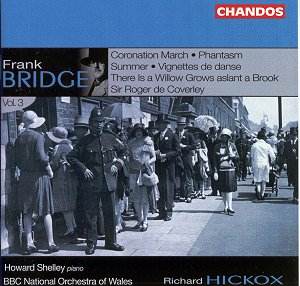This Chandos series
is taking its time to appear. Nothing
wrong with that if the results are good
and this shows that taking time can
produce a better effect even if the
loyal enthusiasts are chafing for the
next release..
Bridge came of a generation
riven by the Great War. The composers
of that epoch were also stung, inspired
or troubled by new musical currents
from Vienna. Bridge may be seen as a
follower of fashion as his music changed
style over the period from 1911 to 1938.
A Tchaikovskian romantic with an impressionistic
palette (Dance Poem and Dance
Rhapsody) evolved into a composer
whose range of expression took in the
harmonic adventures offered by Berg,
Schrecker and Zemlinsky (Oration
and Phantasm). If his music
suffered a critical ice age his conducting
remained in demand although not sufficiently
to command major fees let alone extensive
recordings.
This Chandos collection
takes us from the snappy pomp and lyricism
of the Coronation March via the
Butterworth and Ravel of Summer to
the first stirrings of Continental accents
in There is a Willow to the masterly
ambivalence and mildewed expressionist
complexity of Phantasm.
The March repays
several hearings as its lyrical facets
register more strongly over the celebratory
snap and clash. This is its world premiere
recording and it is worth hearing though
certainly written against his pacifist
character and natural inclination. The
competition for which he wrote the piece
did not award any prizes that year.
I wonder what else was entered.
In Hickox's Summer
one can feel the slow warmth of
the sun in the veins just as much as
the shimmering vigour. Del Mar on a
now elderly recording with the Bournemouth
Sinfonietta (also Chandos) makes a more
breezy magic but Hickox is excellent
at the Delian languor and slow blooming
woodland magic of the piece.
Phantasm is
a major piece of the utmost seriousness
of mood. While works such as Summer,
The Sea, the Two Poems and the two early
dance works expound on sky, scenery
and open air Phantasm is a psychological
rhapsody. It is work that has not been
frequently recorded. Indeed there’s
only one competitor on CD and that is
not currently available (Conifer Stott/RPO/Handley
with the Walton Sinfonia Concertante
and the Ireland concerto). It is a work
that inhabits a land of mildew and troubled
reflection like parts of Bax's Winter
Waters and Saga Fragment.
There is some ruthless nightmare music
as at 6.34 which rises to a sour heroic
rhythmic military gesture for horns
and piano. The soloistic writing is
rather akin to Prokofiev’s Third Concerto
with transient harkings back to the
earlier idyllic style at 7.54. There
is nothing of decoration in this piece;
more a case of a finger trailing through
stagnant waters. There is a ruthless
threat about the emphatic writing for
brass and piano. Indeed it reads like
a prophet’s warning. The depressive
mildewed poetry of There is a Willow
continues the theme of darkness
in music and hovers close to the instrumentals
in Warlock's Curlew. I rather
like Neville Dilkes' old version on
EMI but this outstrips the audio quality
of that analogue version. Hickox's lugubriously
reflective way with the piece works
extremely well.
The Vignettes de
Danse were orchestrated in 1938
from a suite of Mediterranean sketches
originally written in 1925. These ‘postcards’
are a set of subtle chiaroscuros - much
more sophisticated and fragile than
say Bax's Mediterranean or Holst's
Beni Mora and more delicate that
Ibert's Escales.
The disc ends with
a brief dance which I have known previously
only in its versions from string orchestra
(Decca, Britten) and string quartet.
This, most unusually, is for full orchestra
and the treatment is fully coloured
like an intensely imaginative dance
fantasy with moonlight and stars adrift.
The finale in which the tune ‘Roger
de Coverley’ intertwines masterfully
with ‘Auld Lang Syne’ still works its
enchantment although without Britten
and the ECO's carefully weighted judgement
this version at this point suffers in
comparison. This is the sort of piece
that would pair well with Chabrier's
España or Barber's Souvenirs.
Beecham would have made much of this
if only he had been tempted to take
it up.
There is no directed
competition for this disc. It is highly
attractive as a collection. I would
not want to be without Del Mar's Summer,
Dilkes' There is a Willow or
Stott's Phantasm which is leaner
though not as threatening as Shelley's
and Hickox's.
Next will come what
I presume to be the final instalment
including Oration for cello and
orchestra, the late overture Rebus
and the surviving movement from the
incomplete Symphony for Strings.
This disc cuts a broad swathe through
Bridge's stylistic journey providing
a well balanced and attractive collection
which I happily commend.
Rob Barnett
